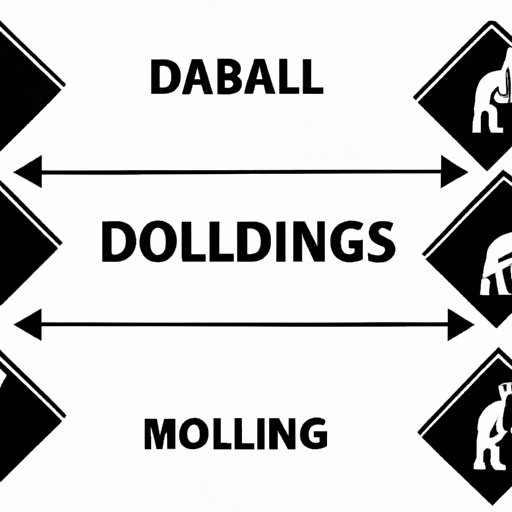Introduction
Are you struggling with making bad decisions? You’re not alone. We all make mistakes from time to time, but when these mistakes become habitual, it can cause significant damage to our lives. In this article, we’ll explore what constitutes poor decision making, as well as the potential root causes and strategies for overcoming them.

Definition of Poor Decision Making
The definition of poor decision making is any choice that results in negative consequences or results in an undesirable outcome. Examples of bad decisions include choosing to drink and drive, engaging in risky behaviors like gambling or drug use, or making a purchase that you can’t afford. Poor decision making can also involve not taking action when necessary, such as procrastinating on important tasks or avoiding difficult conversations.
Reasons Why People Make Bad Decisions
There are many reasons why people make bad decisions. Common causes of poor decision making include lack of self-discipline, impulsivity, and not thinking through the potential consequences of an action. It’s also important to note that certain conditions, such as mental health issues or substance abuse, can affect our ability to think clearly and make informed decisions.

Examining the Root Causes of Poor Decision Making
Let’s take a closer look at some of the root causes of poor decision making.
Lack of Self-Discipline
It’s easy to get caught up in short-term gratification and ignore the long-term consequences of our actions. When we don’t exercise self-control and practice self-discipline, it can lead us to make decisions that are not in our best interest. For example, if we’re feeling overwhelmed by stress, we might decide to take a break and watch TV instead of tackling our to-do list.
Not Thinking Through Consequences
When we don’t think through the consequences of our decisions, it can lead to poor decision making. We may be so focused on the immediate benefit or reward of an action that we don’t consider how it will affect us in the long run. For instance, we may choose to skip studying for an exam because we want to spend time with friends, without considering the potential repercussions of our choice.
Impulsivity
Impulsivity can be another factor in poor decision making. If we act on impulse without considering the potential consequences, we may end up making decisions that we later regret. For example, if we’re feeling angry or frustrated, we might lash out at someone without considering the potential repercussions of our words.
Understanding the Impact of Your Decisions
It’s important to understand the impact of our decisions, both in the short term and in the long term. Poor decision making can have serious consequences, including stress, anxiety, and negative habits forming.

Short Term vs. Long Term Effects
The effects of poor decision making can be felt in both the short term and the long term. In the short term, bad decisions can lead to feelings of guilt, shame, and regret. In the long term, they can lead to financial losses, relationship problems, and other serious consequences.
Stress and Anxiety
Making bad decisions can also lead to stress and anxiety. When we make a mistake, we may feel overwhelmed by guilt and fear. We may also fear the consequences of our choices and worry about how they will affect our future.
Negative Habits Forming
Poor decision making can also lead to the formation of negative habits. When we make bad decisions repeatedly, it can become a pattern. We may start to rely on unhealthy coping mechanisms or engage in riskier behavior as a means of dealing with our stress.
Exploring Strategies to Overcome Impulsive Choices
If you’re struggling with making bad decisions, there are strategies you can use to overcome your impulses and make better choices. Here are some tips for making good decisions:
Practicing Self-Control
One way to overcome impulsive choices is to practice self-control. This means being aware of your emotions and resisting the urge to act on them. It also means delaying gratification and focusing on the long-term benefits of a decision.
Creating a Plan for Making Decisions
Creating a plan for making decisions can help you stay on track. For instance, you can create a list of pros and cons for each decision you’re considering. This will help you to evaluate each option objectively and make a decision based on logic rather than emotion.
Seeking Help from Professionals
If you’re struggling with making bad decisions, it’s important to seek help from a professional. A therapist or counselor can provide guidance and support as you work to overcome your impulses and make better choices.
Developing Self-Awareness for Better Decision Making
Developing self-awareness can also help you make better decisions. Self-awareness involves understanding your thoughts, feelings, and behaviors, as well as their impact on others. It also involves recognizing your triggers and learning to manage your emotions.
Identifying Triggers
One way to develop self-awareness is to identify your triggers. What situations or emotions lead you to make bad decisions? Once you’ve identified these triggers, you can work on developing strategies to manage them and prevent yourself from making impulsive choices.
Monitoring Emotions
Another way to develop self-awareness is to monitor your emotions. Take the time to observe how you’re feeling before making a decision. This will help you gain insight into your emotional state and allow you to make decisions based on logic rather than emotion.
Reflecting on Past Decisions
Reflecting on past decisions can also help you develop self-awareness. Think back to times when you’ve made bad decisions and consider what went wrong. This will help you recognize patterns and gain insight into why you make certain choices.

Analyzing the Reasons Behind Bad Decisions
Finally, it’s important to analyze the reasons behind your bad decisions. Ask yourself why you made the decision and what motivated you to do so. Understanding your motivations can help you make better decisions in the future.
Conclusion
Making bad decisions can have a lasting impact on our lives. It’s important to understand the root causes of poor decision making and explore strategies for overcoming impulsive choices. Practicing self-discipline, creating a plan for making decisions, and developing self-awareness can all help us make better decisions in the future. By taking the time to analyze our motivations and reflect on our past decisions, we can gain insight into why we make certain choices and learn how to make better ones in the future.
(Note: Is this article not meeting your expectations? Do you have knowledge or insights to share? Unlock new opportunities and expand your reach by joining our authors team. Click Registration to join us and share your expertise with our readers.)
